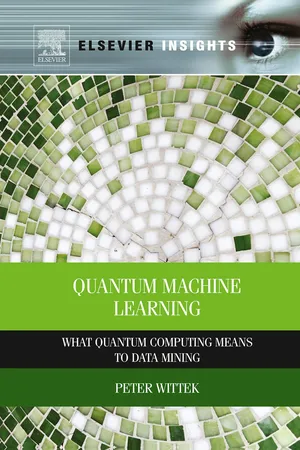
- 176 pages
- English
- ePUB (mobile friendly)
- Available on iOS & Android
About this book
Quantum Machine Learning bridges the gap between abstract developments in quantum computing and the applied research on machine learning. Paring down the complexity of the disciplines involved, it focuses on providing a synthesis that explains the most important machine learning algorithms in a quantum framework. Theoretical advances in quantum computing are hard to follow for computer scientists, and sometimes even for researchers involved in the field. The lack of a step-by-step guide hampers the broader understanding of this emergent interdisciplinary body of research.Quantum Machine Learning sets the scene for a deeper understanding of the subject for readers of different backgrounds. The author has carefully constructed a clear comparison of classical learning algorithms and their quantum counterparts, thus making differences in computational complexity and learning performance apparent. This book synthesizes of a broad array of research into a manageable and concise presentation, with practical examples and applications.- Bridges the gap between abstract developments in quantum computing with the applied research on machine learning- Provides the theoretical minimum of machine learning, quantum mechanics, and quantum computing- Gives step-by-step guidance to a broader understanding of this emergent interdisciplinary body of research
Tools to learn more effectively

Saving Books

Keyword Search

Annotating Text

Listen to it instead
Information
Introduction
Abstract
Table of contents
- Cover image
- Title page
- Table of Contents
- Copyright
- Preface
- Notations
- Part One: Fundamental Concepts
- Part Two: Classical Learning Algorithms
- Part Three: Quantum Computing and Machine Learning
- Bibliography
Frequently asked questions
- Essential is ideal for learners and professionals who enjoy exploring a wide range of subjects. Access the Essential Library with 800,000+ trusted titles and best-sellers across business, personal growth, and the humanities. Includes unlimited reading time and Standard Read Aloud voice.
- Complete: Perfect for advanced learners and researchers needing full, unrestricted access. Unlock 1.4M+ books across hundreds of subjects, including academic and specialized titles. The Complete Plan also includes advanced features like Premium Read Aloud and Research Assistant.
Please note we cannot support devices running on iOS 13 and Android 7 or earlier. Learn more about using the app